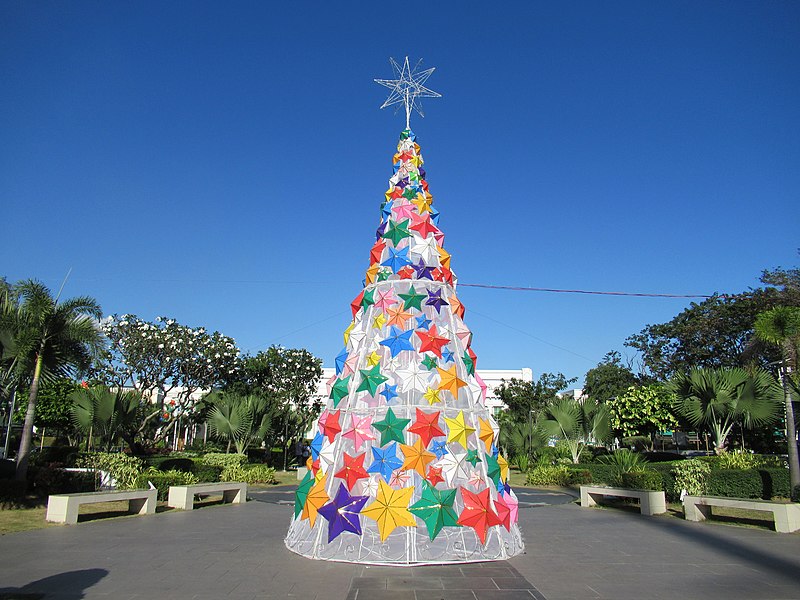Photo credited to FBenjr123
The Philippines celebrate the longest Christmas in the world. Christmas carols and songs start to air on TV and radio from September (ber-months) until January 6 which culminates the feast of three kings. Faraway from the homeland, OFWs carry with them the rich tapestry of their culture, such as during festive seasons. The longing for home, or family and desiring cherished traditions, motivate OFWs to connect with their roots.
Giving back to the community
Filipinos love to share their blessings with others and their home country. Some families organize food drives, clothing, and small treats collected from charities or their own pockets. In every, country where there are a significant number of OFWs, Filipino communities team up. The Commission for Filipinos Overseas manages Philippine Development program or Lingkod sa kapwa Pilipino (LINKAPIL) that provides a system where OFWs can give back or donate to their fellow citizens and home country.
Simbang gabi or evening mass
Attending evening mass (simbang gabi) refers to a devotional, nine-day masses attended by Filipino Catholics. It’s held daily from December 16 to 24 and occur at various times — 3:00 am to 5:00 am. The last day of evening mass is called misa de gallo or (Spanish for ‘rooster’s mass”). According to popular belief, completing simbang gabi can grant favors to those who faithfully attend. Others attend to prepare for Christmas or deepen their faith.
Preparing balikbayan boxes
Many OFWs prepare balikbayan boxes sent months before Christmas. A balikbayan box constitutes cardboard boxes filled with various items such as clothing, canned goods, chocolates, perfume, condiments, pasta, soap, toothpaste, and other items that may be unique to the country of origin or have foreign-made counterparts in the Philippines. Before sending a balikbayan box, make sure to seal it properly and select the best service. There have been reports of boxes tossed or left unattended upon their arrival at Philippine customs or logistics company warehouse.
Technological ties to home
Technology serves as a vital bridge for OFWs seeking to uphold their festive traditions. Video calls, social media platforms, and messaging apps become conduits for sharing moments of merriment with loved ones back in the Philippines. Via virtual celebrations, OFWs partake in the familiar rituals of simbang gabi, exchange heartfelt messages, and witness the joy of their families-all in real-time despite the geographical chasm.
Culinary customs
Whenever Filipinos go, they carry their recipes, and embark on a culinary quest to recreate dishes, follow family recipes and source ingredients. This process of savouring and preparing Christmas food becomes a poignant homage to heritage, invoking nostalgia. Common Christmas or noche buena food include:
-
Barbecue
-
Bibingka (rice cake),
-
Bihon (fried rice noodles)
-
Chicken soup,
-
Coconut salad,
-
Embutido (Filipino-style meatloaf),
-
Ham with pineapple glaze
-
Lechon (meat roast)
-
Macaroni salad,
-
Pansit malabon (rice noodle dish topped with shrimp gravy and seafood)
-
Pinoy-style spaghetti,
-
Puto bumbong (purple rice cake cooked in bamboo tubes)
-
Quezo de bola
-
Red wine
-
Refrigerated cake (graham crackers, mango, fruit, condensed milk layers),
-
Sparkling wine,
-
White wine
Sustaining Generational Legacy
Passing down Christmas traditions to the next generation becomes a cherished endeavor. Filipino expats craft homemade decorations, tell stories, cook noche buena food and attend evening mass to instill cultural identity in their children, ensuring that such traditions endures across continents and generations.
Conducting manito manita
Monito Manita involves exchanging gifts, similar to Secret Santa concept. The mechanics include drawing the person’s name for whom a gift will be purchased. The gift giver’s identity will be kept secret until the exchange — adding an element of excitement and surprise. The gifts may include:
-
book, magazine, or comic
-
candle, diffuser, or incense
-
chocolate, candy, or cookie
-
gift card, voucher, or cash
-
keychain, magnet, or pin
-
mug, tumbler, or water bottle
-
planner, notebook, or journal
-
plant, flower, or succulent
-
puzzle, game, or toy
-
scarf, hat, or glove
The bottomline
As OFWs navigate the complexities of diaspora life, their commitment to maintaining Christmas traditions stands as a poignant reminder of the unbreakable ties that bind hearts across the globe. This celebration embodies the essence of love, resilience, and the enduring warmth of Filipino traditions.

